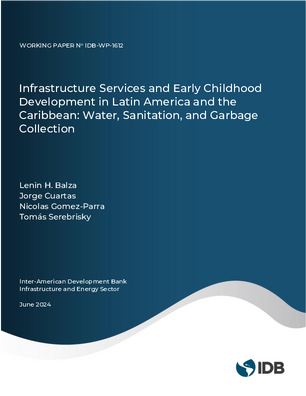Infrastructure Services and Early Childhood Development in Latin America and the Caribbean: Water, Sanitation, and Garbage Collection
Date issued
Jun 2024
Subject
Children;
Early Childhood Development;
Water and Sanitation;
Sanitation Service;
Health;
Infrastructure Development;
Waste Management;
Wastewater Management
JEL code
H41 - Public Goods;
I15 - Health and Economic Development;
J13 - Fertility • Family Planning • Child Care • Children • Youth;
Q53 - Air Pollution • Water Pollution • Noise • Hazardous Waste • Solid Waste • Recycling
Category
Working Papers
Access to essential infrastructure services such as water, sanitation, and garbage collection can considerably affect children's environment and may play a significant role in shaping early childhood developmental and health outcomes. Using data from the Multiple Indicator Cluster Surveys (MICS) and the Demographic and Health Surveys (DHS) for 18 countries in Latin America and the Caribbean (LAC), we show a significant positive association between access to water and sanitation and early childhood development, as well as reduced instances of stunting. In addition, we identify a negative association between access to improved garbage collection services and the rates of stunting and underweight among children under five. Our findings are robust after using alternative measures for access and controlling for individual, maternal, and household factors, alongside considerations of household wealth and caregiver's stimulation activities. Similarly, the economic relevance of the relationship is highlighted by the substantial gap relative to the size of the vulnerable groups, persisting even after adjusting for confounding variables. Our results also suggest that households may be able to lessen the potential impact of pollutants through mitigation measures such as treating water to make it safe for consumption, using handwashing cleansers, and storing household trash in lidded containers. The current findings underscore the importance of investing in basic infrastructure services as a critical component of comprehensive strategies to enhance early childhood development and health in low- and middle-income countries. We emphasize the importance of considering the quality and type of infrastructure services alongside their availability. Future research should incorporate more complete and detailed data to improve understanding of the causal relationship between water, sanitation, and garbage collection and early childhood development, as well as the mechanisms underlying the observed associations.
Generative AI enabled




